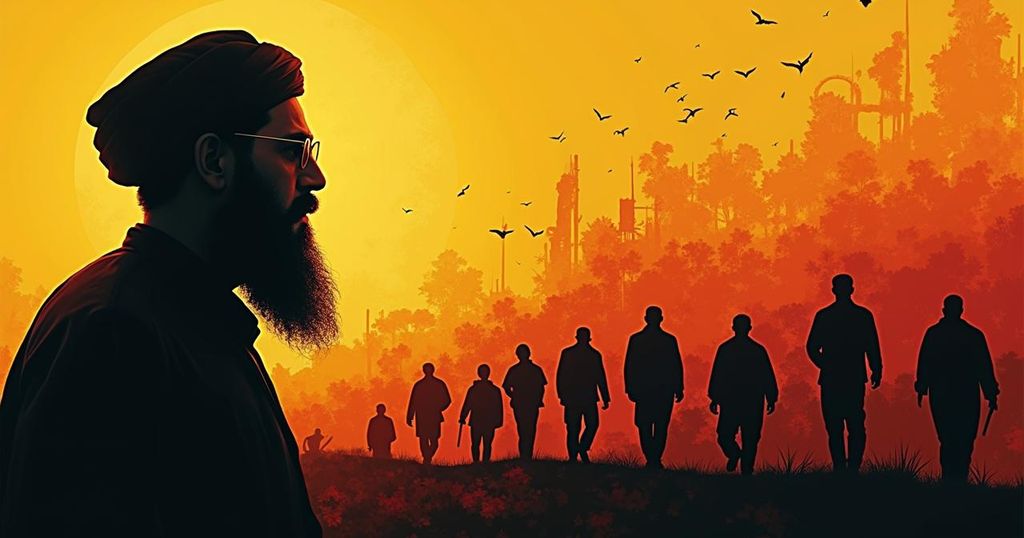Hassan Nasrallah, the long-serving leader of Hezbollah, was killed in an Israeli airstrike on Beirut. Once celebrated for his opposition to Israel, Nasrallah’s reputation diminished due to Hezbollah’s involvement in Syria and past controversies, including allegations related to the assassination of Rafik Hariri. Born in 1960 in East Beirut and ascending to leadership in 1992, he became a pivotal figure in Lebanese politics, promoting unity among sects while maintaining Hezbollah’s military strength. His assassination poses substantial challenges for Hezbollah amid ongoing regional tensions.
Hassan Nasrallah, the long-serving leader of Hezbollah, has been killed in a significant Israeli airstrike on Beirut, a development confirmed by the Lebanese militant group. The Israeli military had anticipated this assassination earlier on the same day. Having ascended to remarkable prominence following the 2006 war with Israel, Nasrallah was frequently hailed as a hero, not only within Lebanon but also in the broader Arab world. His image was largely sculpted by his staunch opposition to Israel, a principle that guided Hezbollah for many years. However, this perception shifted when Hezbollah intervened in the Syrian war to bolster President Bashar al-Assad’s regime, leading many to view Nasrallah not as a leader of resistance but as a figure of Iranian geopolitical interests, attracting criticism from various Arab states. Prior to Hezbollah’s involvement in Syria, Nasrallah struggled to dispel allegations regarding his faction’s involvement in the 2005 assassination of former Lebanese Prime Minister Rafik Hariri, which resulted in indictments against several Hezbollah members by an international tribunal, with one member later convicted. Despite these controversies, his support base, primarily Lebanon’s Shia Muslims, remained steadfast, perceiving him as both a political and religious figurehead. Born in East Beirut in 1960, Nasrallah’s upbringing was deeply influenced by the sociopolitical climate of the time. He was one of nine children and displayed a pious disposition from a young age, often seeking out Islamic literature. His political ideology was initially shaped by the teachings of Musa al-Sadr, the founder of the Movement of the Deprived, which laid the groundwork for the later formation of Hezbollah. After departing from Amal, the movement he initially joined, during the 1982 Israeli invasion of Lebanon, Nasrallah, with Iranian backing, founded Hezbollah, which emerged as a counterforce to both Israeli and Lebanese political dynamics. By the 1990s, after a tumultuous civil war, Nasrallah had risen to prominence within Hezbollah, becoming its third secretary-general in 1992 following the death of Abbas al-Musawi. His public persona was that of a compassionate and relatable leader, often using plain language to connect with the populace, which contrasts with the formal Arabic typically used by other politicians. His rhetoric intertwined political advocacy with religious sentiment, elevating his status as a spokesperson for the Shia community. Under Nasrallah’s leadership, Hezbollah transitioned into a recognized political entity within Lebanon’s complex political landscape, partaking in democratic elections since 1992. He emphasized unity among Lebanon’s various sects, stating, “We, Shia and Sunnis, are fighting together against Israel” and expressed confidence in preventing sectarian strife within the country. Despite his lack of formal political office, Nasrallah was considered the pivotal figure in Lebanese politics, exercising substantial influence. However, he faced criticism for his firm refusal to disarm Hezbollah and his handling of domestic unrest, particularly during protests in 2019. Observers have labeled him an agent of Iranian interests in Lebanon, juxtaposed against the backdrop of widespread economic hardship and political instability. Hezbollah’s recent conflict with Israel, exacerbated by tensions arising from Gaza, marked one of the group’s most severe challenges, resulting in significant personnel losses. Nasrallah remained resolute throughout these escalating confrontations, embodying the group’s determination to confront Israeli forces. While Nasrallah has been recognized as the embodiment of Hezbollah’s identity and ideology, the group’s intricate organizational structure suggests it will endure his loss. Nevertheless, the search for his successor will be critical, influencing Hezbollah’s future trajectory and the broader implications for Lebanon and the Middle East.
Hassan Nasrallah was the influential leader of Hezbollah, an organization formed in the early 1980s amid Lebanon’s civil war and heavily supported by Iran. His leadership spanned over three decades, marked by significant military and political developments. During this time, Nasrallah’s rhetorical approach combined religious and political narratives, appealing to both Shia and broader Lebanese audiences. His involvement in the Syrian Civil War and various geopolitical conflicts shifted perceptions of Hezbollah from a resistance movement to a player in regional power dynamics, attracting both criticism and support. As Israeli strikes continue to target Hezbollah and its members, Nasrallah’s assassination highlights the ongoing volatility within Lebanon and the greater Middle Eastern geopolitical landscape.
The killing of Hassan Nasrallah signifies a pivotal moment for Hezbollah, as the group confronts the challenge of leadership transition amidst ongoing conflicts with Israel and domestic pressures. His legacy as a charismatic leader who shaped Hezbollah’s identity and political strategy will undoubtedly influence the organization’s future direction. As Hezbollah seeks to appoint a new leader, the implications of this change will reverberate not only within Lebanon but also across the regional geopolitical arena.
Original Source: kashmirreader.com






